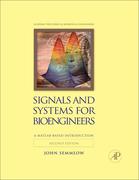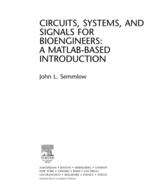Did you mean:
Bioengineered16 Results for : bioengineers
-

Biomedical Engineering Applications for People with Disabilities and the Elderly in the Covid-19 Pandemic and Beyond
Biomedical Engineering Applications for People with Disabilities and the Elderly in the COVID-19 Pandemic and Beyond presents biomedical engineering applications used to manage people's disabilities and care for the elderly to improve their quality of life and extend life expectancy. This edited book covers all aspects of assistive technologies, including the Internet of Things (IoT), telemedicine, e-Health, m-Health, smart sensors, robotics, devices for rehabilitation, and "serious" games. This book will prove useful for bioengineers, computer science undergraduate and postgraduate students, researchers, practitioners, biomedical engineering students, healthcare workers, and medical doctors. This volume introduces recent advances in biomaterials, sensors, cellular engineering, biomedical devices, nanotechnology, and biomechanics applied in caring for the elderly and people with disabilities. The unique focus of this book is on the needs of this user base during emergency and disaster situations. The content includes risk reduction, emergency planning, response, disaster recovery, and needs assessment. This book offers readers multiple perspectives on a wide range of topics from a variety of disciplines. This book answers two key questions: What challenges will the elderly and people with disabilities face during a pandemic? How can new (or emerging) advances in biomedical engineering help with these challenges?- Shop: buecher
- Price: 147.99 EUR excl. shipping
-

Seed , Hörbuch, Digital, ungekürzt, 765min
It''s the dawn of the 22nd century, and the world has fallen apart. Decades of war and resource depletion have toppled governments. The ecosystem has collapsed. A new dust bowl sweeps the American West. The United States has become a nation of migrants - starving masses of nomads who seek out a living in desert wastelands and encampments outside government seed-distribution warehouses. In this new world, there is a new power. Satori is more than just a corporation, she is an intelligent, living city that grew out of the ruins of Denver. Satori bioengineers both the climate-resistant seed that feeds a hungry nation, and her own post-human genetic Designers, Advocates, and Laborers. What remains of the United States government now exists solely to distribute Satori seed; a defeated American military doles out bar-coded, single-use Satori seed to the nation's starving citizens. When one of Satori's Designers goes rogue, Agent Sienna Doss - ex-Army Ranger turned glorified bodyguard - is tasked by the government to bring her in: The government wants to use the Designer to break Satori's stranglehold on seed production and reassert themselves as the center of power. Sianna Doss's search for the Designer intersects with Brood and his younger brother Pollo - orphans scrapping by on the fringes of the wastelands. Pollo is abducted, because he is believed to suffer from Tet, a newly emergent disease, the victims of which are harvested by Satori. As events spin out of control, Brood and Sienna Doss find themselves at the heart of Satori, where an explosive climax promises to reshape the future of the world. ungekürzt. Language: English. Narrator: Nicola Barber. Audio sample: https://samples.audible.de/bk/adbl/004130/bk_adbl_004130_sample.mp3. Digital audiobook in aax.- Shop: Audible
- Price: 9.95 EUR excl. shipping
-

To the Best of Our Knowledge: American Invention, Hörbuch, Digital, 52min
In this hour, if we’re going to talk about invention in the US we need to talk with Nathan Myrhvold. He was Microsoft’s first Chief Technology Officer. He holds 17 patents with Microsoft and 117 with his company Intellectual Ventures. But he’s not just a billionaire tech-nerd. He’s also explored the world’s volcanoes. Studied penguin digestion. Found several T Rexes. Built a section of Babbage’s Difference Engine. He’s even the World Barbecue Grand Champion. Anne Strainchamps caught up with Myhrvold to talk about inventing and his six-volume, 2400-page, 52 pound cookbook called Modernist Cuisine. Next, why has America stopped inventing? That’s the provocative title of a book by Darin Gibby. Gibby’s a patent lawyer and points out that Americans invent less than half of what we did a century ago. Half. Why? Are we less creative then we were 100 years ago? Gibby says the problem lies in one place and one place only – The US Patent system. He tells Anne Strainchamps the current system has got to go. Then, in a recent interview with Wired magazine Bill Gates said that if he were a teenager today, he would not be into computing, he’d be hacking biology. He said, “If you want to change the world in some big way, that’s where you start – biological molecules.” Hacking biology, huh? Well, it’s not science fiction anymore. Welcome to the 21st Centrury and the Biopunk Movement where biohacking and kitchen table biotech are the norm. Steve Paulson sat down with journalist Marcus Wohlsen, author of Biopunk, to find out more about these DIY bioengineers. Like, is this legal?After that, don't ask Anna Dietrich if she invented a car that can fly. No one can do that she says. She did, however, invent a plane that can drive. It’s called the Transition. This car/plane or plane/car, whatever you call it, was dreamed up over beers with a bunch of fellow MIT students. The Transition’s recent introduction at the 2012 New York Internati Language: English. Narrator: Jim Fleming. Audio sample: https://samples.audible.de/rt/tbon/130301/rt_tbon_130301_sample.mp3. Digital audiobook in aax.- Shop: Audible
- Price: 9.95 EUR excl. shipping
-

To the Best of Our Knowledge: American Invention, Hörbuch, Digital, 52min
In this hour, if we’re going to talk about invention in the US we need to talk with Nathan Myrhvold. He was Microsoft’s first Chief Technology Officer. He holds 17 patents with Microsoft and 117 with his company Intellectual Ventures. But he’s not just a billionaire tech-nerd. He’s also explored the world’s volcanoes. Studied penguin digestion. Found several T Rexes. Built a section of Babbage’s Difference Engine. He’s even the World Barbecue Grand Champion. Anne Strainchamps caught up with Myhrvold to talk about inventing and his six-volume, 2400-page, 52 pound cookbook called Modernist Cuisine. Next, why has America stopped inventing? That’s the provocative title of a book by Darin Gibby. Gibby’s a patent lawyer and points out that Americans invent less than half of what we did a century ago. Half. Why? Are we less creative then we were 100 years ago? Gibby says the problem lies in one place and one place only – The US Patent system. He tells Anne Strainchamps the current system has got to go. Then, in a recent interview with Wired magazine Bill Gates said that if he were a teenager today, he would not be into computing, he’d be hacking biology. He said, “If you want to change the world in some big way, that’s where you start – biological molecules.” Hacking biology, huh? Well, it’s not science fiction anymore. Welcome to the 21st Centrury and the Biopunk Movement where biohacking and kitchen table biotech are the norm. Steve Paulson sat down with journalist Marcus Wohlsen, author of Biopunk, to find out more about these DIY bioengineers. Like, is this legal? After that, don't ask Anna Dietrich if she invented a car that can fly. No one can do that she says. She did, however, invent a plane that can drive. It’s called the Transition. This car/plane or plane/car, whatever you call it, was dreamed up over beers with a bunch of fellow MIT students. The Transition’s recent introduction at the 2012 New York International Language: English. Audio sample: https://samples.audible.de/rt/tbon/120516/rt_tbon_120516_sample.mp3. Digital audiobook in aax.- Shop: Audible
- Price: 9.95 EUR excl. shipping
-

Signals and Systems for Bioengineers
Signals and Systems for Bioengineers - A MATLAB-Based Introduction: ab 57.49 €- Shop: ebook.de
- Price: 57.49 EUR excl. shipping
-

Circuits Signals and Systems for Bioengineers
Circuits Signals and Systems for Bioengineers - A MATLAB-Based Introduction: ab 95.99 €- Shop: ebook.de
- Price: 95.99 EUR excl. shipping